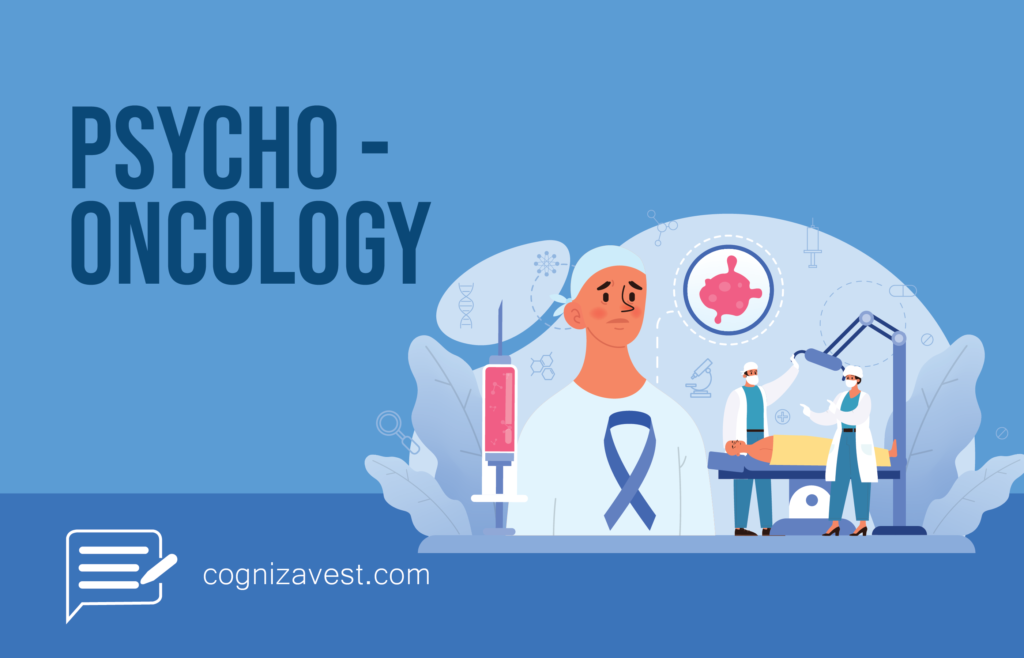Psycho-oncology is a field of medicine that focuses on the psychological, social and emotional aspects of cancer. It helps to support those affected by cancer throughout their journey, from diagnosis to survivorship or end of life care. Psycho-oncologists provide holistic care for patients and their families in order to improve physical, mental, and emotional wellbeing during such a difficult period. Psycho-oncology is a rapidly growing field that focuses on the psychological, emotional, and social aspects of cancer and its treatment. It is a multidisciplinary field that involves a wide range of professionals, including psychologists, psychiatrists, social workers, and nurses. The goal of psycho-oncology is to provide patients and their families with the support and resources they need to cope with the emotional and psychological challenges of cancer.
Why we need psycho-oncology
One of the main challenges of cancer is the emotional toll it can take on patients and their loved ones. Cancer can cause feelings of fear, anxiety, and depression, which can make it difficult for patients to cope with the physical and emotional challenges of the disease. Psycho-oncology professionals work to identify and address these emotional and psychological issues, and to provide patients with the support and resources they need to manage them.
Another important aspect of psycho-oncology is the support it provides to families of cancer patients. Cancer can be a difficult and stressful experience for loved ones, and they may also experience a range of emotional and psychological challenges. Psycho-oncology professionals are dedicated to helping families during the difficult times that come with a cancer diagnosis. They understand the emotional and psychological impacts of cancer, and strive to provide support and guidance for families as they work through their journey. Through various counseling techniques, these professionals help patients and their families cope with the physical, mental, and spiritual pain associated with cancer to make it more manageable.
Read Also
Tools used in psycho-oncology
Here are many tools and combination of therapies that are used in the field of psycho-oncology. One of the most important tools used in psycho-oncology is counseling. Counseling in psycho-oncology can provide invaluable support to patients and their families who are going through the trauma of a cancer diagnosis. It can help them work through difficult emotions, provide practical advice on how to cope with stress and changes in lifestyle, and help develop strong interpersonal skills for better communication. Counseling can also help address fears about the future, providing a safe environment in which patients and their families can talk openly about their concerns and receive guidance in facing them.
Another important tool used in psycho-oncology is medication. Medication can be an effective way to manage the symptoms of anxiety and depression, which are common side effects of cancer. By prescribing the appropriate medication, doctors can help patients effectively cope with the physical, emotional, and mental changes caused by their cancer diagnosis. Additionally, medication can help reduce the intensity of some symptoms such as sleeplessness, fatigue, and stress that often accompany a cancer diagnosis.
In addition to the counseling and pharmaceutical therapy, psych oncology also used other psychotherapeutic approaches. These psychotherapeutic approaches include cognitive behavioral therapy, acceptance and commitment therapy and behavioral modification. Cognitive behavioral therapy help the client to overcome the negative emotions and acceptance and commitment therapy help in accepting the pain. Along with this psychologist also do regulate distress check
Cognitive-Behavioral Therapy (CBT) has been used in psycho-oncology to help individuals cope with the physical, psychological, and emotional challenges of living with cancer. CBT has the potential to improve the quality of life for individuals by reducing anxiety levels, improving moods, and helping people adjust to the changes brought on by a diagnosis. This type of therapy is also beneficial in helping patients develop coping skills that can be used long after treatment ends.
Act in psych-oncology is an evidence-based and empirically validated approach to psychological treatments for cancer patients. It uses a combination of acceptance, mindfulness and behavior change techniques to help individuals cope with the distress associated with their diagnosis. The use of act in psycho-oncology helps individuals to recognize unhelpful ways of thinking and behaving, as well as promoting positive attitude and behavior changes that can improve overall quality of life. It also aims to reduce suffering by helping people learn how to accept, observe, and change their thoughts, feelings and behaviors in order to move through difficult situations with greater ease.
Conclusion
In conclusion, psycho-oncology is an important field that focuses on the emotional and psychological aspects of cancer and its treatment. It involves a wide range of professionals who work to provide patients and their families with the support and resources they need to cope with the emotional and psychological challenges of cancer. The field also uses counseling and medication as important tools to help patients and their families manage the emotional and psychological aspects of cancer. With the increasing awareness and understanding of psycho-oncology, it is becoming more important for cancer care centers and hospitals to integrate psycho-oncology into their care, in order to provide comprehensive care for patients and their families.



